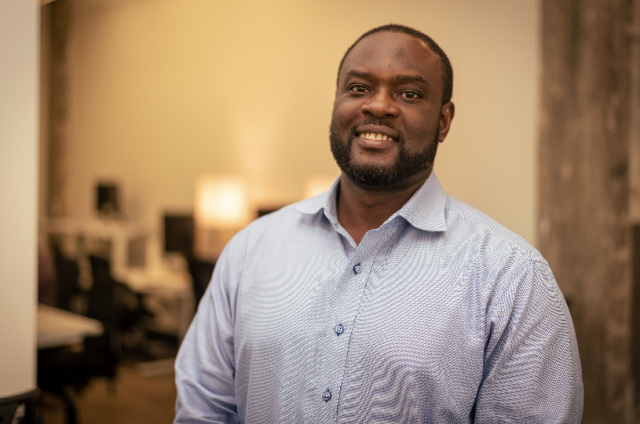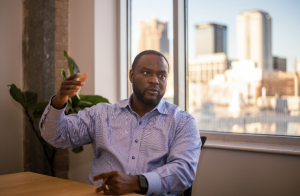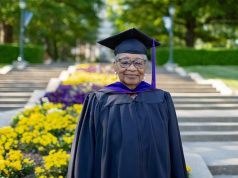
By Ryan Michaels
The Birmingham Times
Tucked away inside a conference room at his company’s temporary headquarters at Innovation Depot on First Avenue North, Shegun Otulana has just finished laying out a simple concept he uses to progress in anything from a career, to knowledge, to relationships.
“Density,” he says, is the key to advancement. He uses the example of a university education, which compresses book-learning, job discovery and socialization into approximately four years.
“The mistake many people make is they want to learn something, but that initial cycle of learning gets extended too far, so the thing that you should compact into three months and then start compounding…you spread it out over 10 years,” said Otulana, in between sips of a lime seltzer.
Startup businesses work the same way, he said.
“Make all the mistakes. See what works. See what doesn’t work because what happens is you’ve condensed three, four years of learning into three months of mistakes,” Otulana said.
And Otulana should know. In 2021, he sold one of his companies for $1.2 billion, and today, heads Harmony Venture Labs (HVL), a leading innovation and growth company in Birmingham’s burgeoning technology space.
Over the course of several months in 1998, Otulana was one of three teenagers who left Nigeria to begin their college careers at the University of Alabama at Birmingham (UAB). The other two were Stephen Odaibo and Bolaji Kukoyi.
Twenty-five years later, they clearly got it right. Otulana has sold one of his software startups for $1.25 billion; Kukoyi runs an engineering firm that has helped design and build many of the most recognizable new spaces including the Regions Field ballpark, and Protective Stadium; and Odaibo, M.D. is the founder, CEO and chief software architect of RETINA-AI Health, which has developed an automated screening device for diabetic retinopathy.
Though Birmingham is not his first home, Otulana has come to embrace his role in helping to build Birmingham. He said his desire is for companies that work with HVL to create a “thriving ecosystem” in the city.
“Hopefully, they become really big institutions here in Birmingham over the next decade,” Otulana said.
Committed to Birmingham

The Lagos, Nigeria-raised Otulana first came to the city in 1998 to attend the University of Alabama at Birmingham, where he studied electrical engineering and managing information systems (MIS).
Otulana already had one brother, Ade, studying at UAB at the time, who went on to medical school in New Jersey before returning to Birmingham to professionally practice.
Since graduating from the university with his bachelor’s degree in MIS in 2003, Otulana has been busy becoming one of the most successful entrepreneurs in Birmingham’s tech scene.
In 2013, Otulana started TheraNest, a software product that allows behavioral health providers to manage all facets of their therapy business. In 2017, he created Therapy Brands, a company which would house TheraNest and other software-as-a-service (SaaS) products for therapists.
After selling Therapy Brands, which produces software for mental and behavioral practices, to global investment firm KKR for $1.2 billion in May 2021, Otulana started HVL, which seeks to build companies and their own software products.
The entrepreneur told UAB Magazine in 2022 that he and his wife Mary Fouad’s connections to Birmingham are important.
“We have a lot of ties to Birmingham. We don’t run from where we have ties, we build on them. We build more TheraNests. We put a stake in the ground and say, for however long I’m here, I have an obligation to this place and its people,” Otulana told UAB.
Otulana, a product of entrepreneurial parents, believes some of their drive rubbed off on him.
“My parents were not very educated, they just hustled — renting property out, owning gas stations. They did what they could. I had no interest in my parents’ business, but you do see this correlation between entrepreneurial parents and entrepreneurial children,” he told UAB.
Growing Up
Growing up Black in majority Black Nigeria may have aided his success in America, he said.
“There is something about not being a minority for the first 18 years of your life. By then, you’re already formed as a person, to a large extent…The doctors, engineers, shopkeepers, barbers, janitors, scientists, they all look like you. It affects how you behave, subconsciously, in a way it could not affect [Black people] born here,” Otulana told AL.com in 2018.
When he first came to the US, Otulana’s first passion was computer engineering, but UAB did not offer it to undergraduates at the time. After graduating with his MIS degree, Otulana began working positions managing systems.
Fresh out of school, Otulana started working for U.S. Infrastructure as a network administrator and then IT manager from 2003 to 2007, before moving to become senior systems administrator at BioHorizons Implant Systems, based in Hoover.
In April 2004, Otulana also founded Zertis with a few partners. At its core, Zertis was a software consulting business. Clients would reach out to the company hoping Otulana and company could build a software solution for their business.
Their clients included a variety of small businesses, including attorneys, home health care operators and at least one lumber company.
And in addition to the custom software side, Zertis tried many different products, like its flagship FlareStar server, which used open-source software to provide a networking solution for companies that might not be able to pay for Microsoft Windows services.
Zertis served as an early “ideation lab” for Otulana and has influenced his approach with HVL, he said.
“I was doing consulting work Zertis, but at the same time I was using Zertis to find problems in the world that I would be excited about fixing because what’s consulting? Consulting is getting introduced to other people’s problems and then trying to find a solution,” Otulana said.
While Otulana stepped away from Zertis in the late 2000s, he decided to come back, quitting his job at BioHorizons in 2010. His wife Mary pushed him toward Zertis, knowing he was more interested in the entrepreneurial side of his work.
TheraNest
In January 2011, Otulana returned as the CEO of Zertis, and within a couple years, he released the product that has made his name throughout the city, TheraNest.
After testing with a few clients, including Crystal Mullen-Johnson, now CEO of Thrive Counseling, TheraNest was released publicly in May 2013.
Up to that point, Otulana had been interested in health care-related SaaS service products because of the untapped potential and room for improvement he saw in the space, but his moment finally came when a local mental health professional asked for help.
While the therapist couldn’t afford to have Otulana to build out all the software, Otulana said he couldn’t find an existing replacement that the therapist could use.
“That research really opened my eyes to the market and the potential opportunity,” Otulana told AL.com.
In August of 2013, Otulana stepped down from his post as CEO of Zertis to focus on TheraNest.
With HVL, Otulana said he would like to build 10 companies over the next 10 years. Many entrepreneurs struggle without the knowledge of entities like HVL, he said.
“I’ve witnessed entrepreneurs making the same mistakes over and over again throughout the ideation, customer validation and product development stages of growing a company,” Otulana told ComebackTown.
With HVL, Otulana said he is seeking to ensure that many early-stage companies can understand whether they are heading in the right direction.
“I’ve found a way to avoid many common startup pitfalls by doing market validation first. You can significantly increase chances of success by ensuring there is a big enough problem in the market that people actually care about,” Otulana told ComebackTown.
‘Why We’re Here’
In addition to seeking “market validation,” Otulana said it’s important to build companies that are profitable and spend their money efficiently which is what happened with TheraNest and Therapy Brands.
“We became very profitable very fast. We did not raise a lot of money. My company was very capital efficient and built a company that became profitable within its second year. This is certainly not the norm, but being capital efficient has become a best practice,” told ComebackTown.
Otulana said entrepreneurial skills are not purely the result of luck or birth.
“Everything we do as people requires creativity and ingenuity. But the situation is a little different when you are growing a startup. You need to be always on, need to move fast, need good ways to manage the stress, to tell a story and be able to get others to believe in that story and project a compelling vision,” Otulana told UAB.
At HVL, Otulana said the goal is to help the right companies grow.
“If 20 people start companies, six will succeed to varying degrees as long as they are in the right environment and they get the timing of the idea right. Another six will fail…The remaining eight can learn, and we are able to nudge them to figure it out and build. We hope to help them build right here in Birmingham,” Otulana said.
What keeps Otulana going in building companies, he said, is his care for family and his belief in the importance of “economic freedom.”
“It alleviates suffering. It raises lives, at least in this present world that we see. It solves a lot of the human problem, and I know of no better vehicle to solve this problem than to give people economic empowerment, and the number one way I know of giving people economic empowerment is through entrepreneurship,” Otulana said.
Simply seeing other people achieve their potential is a particular favorite aspect of growing entrepreneurship, Otulana said.
“I also have a lot of fun just seeing people, whether they’re entrepreneurs or not, kind of just maxing out their potential,” Otulana said. “I just think that’s why we’re here.”
TIMELINE
Shegun Otulana
1998 – Arrives in Birmingham to attend UAB where he studies electrical engineering and managing information systems (MIS).
2003 — Starts working for U.S. Infrastructure as a network administrator.
2004 – Starts his first company, Zertis, a software consulting company that built software products.
2007 — Leaves U.S. Infrastructure for a job as a senior systems administrator at BioHorizons Implant Systems in Birmingham.
2011 — After a hiatus from the company, becomes CEO of Zertis.
2013 — Creates TheraNest which provides a software solution that allows behavioral health providers to manage all facets of their therapy business.
2017 — Founds Therapy Brands as a parent company of TheraNest, which becomes one of a number of services offered to behavioral health providers by Therapy Brands.
2018 — Two separate funds invest in Therapy Brands, which had garnered thousands of corporate customers, making it the majority investors in the company.
2020 — Steps down as CEO but continues to serve on the Therapy Brands board.
2020 – Founds Harmony Venture Labs (HVL), which seeks to help startups in the technology space build themselves up, both on the technology and business fronts.
2021 — Global investment firm KKR closes its acquisition of Therapy Brands for $1.2 billion
2021 — Through a partnership with HVL and growth equity firm PSG, Canadian company Copysmith raises $10 million in funding.
2021 — Assumes the role of CEO for Copysmith, which provides AI-generated copywriting for other businesses, and moves the company’s headquarters to Birmingham.




